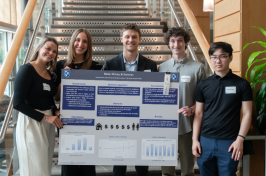
Molly O’Shea ’21 typically starts her day at 7:30 a.m., driving to the houses and apartments of clients to urge them to take their medication, which many are reluctant to do despite its being required as a condition of their living independently. Most have been released from New Hampshire Hospital, the state’s only psychiatric facility, in Concord.
On one particular day in November, she visited a young man with severe schizophrenia who had moved back in with his parents.
“We’re seeing more young people come in with symptoms of psychosis,” observes O’Shea, sounding for all the world like a wizened veteran rather than what she is, a recent UNH grad who majored in psychology and justice studies. “Most of my clients don’t live with family. They don’t have many natural supports.” In the case of the young man, she will spend her time that morning building rapport with the parents and son and reassure them they aren’t alone.
Then, she’s off to an 11 a.m. team meeting at Community Partners in Rochester where she works as a functional support specialist on an assertive community treatment team, which maintains a caseload of 80-90 clients in Rochester, Dover, Farmington and Somersworth. “We provide mental health services for adults who have a primary diagnosis of a severe and persistent mental illness, which includes diagnosis of one of the two bipolar disorders — schizophrenia disorder and schizoaffective disorder — and major depressive disorder,” she notes.
O’Shea is a “community-based employee,” which means she meets clients in their homes rather than a hospital, helping them meet their basic needs such as taking them to the grocery store or medical appointments or helping them apply for Medicaid or food stamps.
After lunch, she will visit a client who is homeless and staying with her boyfriend's parents, where “there's a lot of conflict,” and then a young person who is also living with his parents. There she will help him learn about the course his mental illness will likely take as he gets older. “He hasn’t been experiencing it for decades, as many of my clients have,” O’Shea pointed out. Her day will end more or less around 5 p.m. after she has completed her paperwork, which will be read and acted on by her teammates, which includes therapists, other specialists like herself and social workers.
“When you think about who is providing a large share of the frontline workers in the state’s mental health field, you have to include UNH psychology in the picture.”
O’Shea likes the fast-paced environment of her work, and the “opportunity to solve a crisis” is clearly something she cherishes. She likes what she does well enough to pursue an online Master’s degree in social work from UNH, which will open up new avenues of opportunity. But we the good people of New Hampshire should get down on our knees and thank golly for Ms. Molly, and while we’re at it, the rest of the UNH psychology majors who provide so much of the frontline work in mental and behavioral health these days.
Joan Glutting, clinical professor of psychology, is intimately involved in populating the state’s mental health field with enthusiastic workers like O’Shea. “We have about 800 majors in psychology, and about half want to go into a clinical field,” says Glutting. “Of these, about 75 will go through our internship or advanced internship programs each year.
“So, when you think about who is providing a large share of the frontline workers in the state’s mental health field, you have to include UNH psychology in the picture.”
Mental health isn’t generally a default occupation, one of those fields you just kind of fall into. All of the students who enter the field have gone through a carefully developed program that begins with introductory courses in psychology, abnormal psychology and psychotherapy theories, and progresses to a semester-long internship at one of UNH’s extensive network of sites. These include child advocacy center, community mental health centers, residential homes for children, centers for sexual assault, crisis intervention and education, homeless shelters, hospice, public defenders offices and a plethora of agencies dealing with childhood and adult sexual or emotional abuse.

“The great thing about the internship,” says Melanie Slaybe ’19, another psychology alum working in mental health field, “is that all of the students meet weekly to learn from one another and help each other out. You also get a glimpse of other kinds of settings you might be interested in.”
Glutting says the state of New Hampshire is “really, really struggling to fill mental health positions” and that the problem has arisen because of long-deferred raises for mental health workers — Massachusetts recently raised salaries — rising mental health problems and the pandemic’s drain on resources. The result, she said, is that “we have more and more people waiting for fewer and fewer resources to help them. This year, there are 210 open positions in mental health in New Hampshire.”
Amid this rather dire situation, Glutting sees two glimmers of promise. The first is Governor Chris Sununu’s purchase of a new psychiatric facility, the State Hospital for Children in Hampstead. The second comes from people, like O’Shea and Slaybe, she sees coming through her program — people with a fire in the belly to make a difference.
“I think they want meaning in their work,” Glutting said. “They want to feel like they are contributing to something that's important in the world, which is being able to help people who cannot help themselves.”
One of those who will be helping others is Slaybe. She had a prestigious fellowship at Boston’s renowned McLean Hospital before bringing her talents back to the Granite State to become a children’s case manager at the Center for Life Management in Derry.
Slaybe says she enjoys working with kids before their illnesses have had many years to beat them down and stack too many of life’s cards against them. She feels it’s an important age to target them with help. “Targeting mental illness early can help young people living with it cope better later on,” she observed. “I’ve seen kids go from feeling completely lost to feeling calm and ready to move forward. That’s what gives me the most satisfaction at work.”
-
Written By:
Dave Moore | Freelance Writer

















































